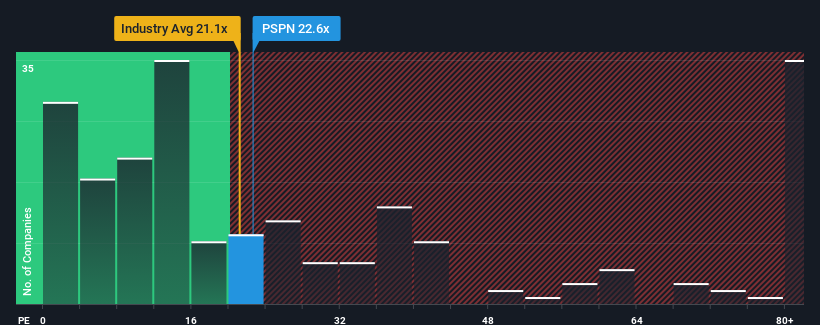- Switzerland
- /
- Real Estate
- /
- SWX:PSPN
PSP Swiss Property AG's (VTX:PSPN) Business Is Yet to Catch Up With Its Share Price

With a median price-to-earnings (or "P/E") ratio of close to 22x in Switzerland, you could be forgiven for feeling indifferent about PSP Swiss Property AG's (VTX:PSPN) P/E ratio of 22.6x. However, investors might be overlooking a clear opportunity or potential setback if there is no rational basis for the P/E.
PSP Swiss Property hasn't been tracking well recently as its declining earnings compare poorly to other companies, which have seen some growth on average. It might be that many expect the dour earnings performance to strengthen positively, which has kept the P/E from falling. If not, then existing shareholders may be a little nervous about the viability of the share price.
See our latest analysis for PSP Swiss Property

Does Growth Match The P/E?
PSP Swiss Property's P/E ratio would be typical for a company that's only expected to deliver moderate growth, and importantly, perform in line with the market.
If we review the last year of earnings, dishearteningly the company's profits fell to the tune of 25%. As a result, earnings from three years ago have also fallen 30% overall. So unfortunately, we have to acknowledge that the company has not done a great job of growing earnings over that time.
Turning to the outlook, the next three years should generate growth of 6.9% each year as estimated by the eight analysts watching the company. With the market predicted to deliver 11% growth per annum, the company is positioned for a weaker earnings result.
In light of this, it's curious that PSP Swiss Property's P/E sits in line with the majority of other companies. Apparently many investors in the company are less bearish than analysts indicate and aren't willing to let go of their stock right now. These shareholders may be setting themselves up for future disappointment if the P/E falls to levels more in line with the growth outlook.
What We Can Learn From PSP Swiss Property's P/E?
Generally, our preference is to limit the use of the price-to-earnings ratio to establishing what the market thinks about the overall health of a company.
We've established that PSP Swiss Property currently trades on a higher than expected P/E since its forecast growth is lower than the wider market. When we see a weak earnings outlook with slower than market growth, we suspect the share price is at risk of declining, sending the moderate P/E lower. Unless these conditions improve, it's challenging to accept these prices as being reasonable.
And what about other risks? Every company has them, and we've spotted 3 warning signs for PSP Swiss Property (of which 1 is potentially serious!) you should know about.
If these risks are making you reconsider your opinion on PSP Swiss Property, explore our interactive list of high quality stocks to get an idea of what else is out there.
If you're looking to trade PSP Swiss Property, open an account with the lowest-cost platform trusted by professionals, Interactive Brokers.
With clients in over 200 countries and territories, and access to 160 markets, IBKR lets you trade stocks, options, futures, forex, bonds and funds from a single integrated account.
Enjoy no hidden fees, no account minimums, and FX conversion rates as low as 0.03%, far better than what most brokers offer.
Sponsored ContentNew: Manage All Your Stock Portfolios in One Place
We've created the ultimate portfolio companion for stock investors, and it's free.
• Connect an unlimited number of Portfolios and see your total in one currency
• Be alerted to new Warning Signs or Risks via email or mobile
• Track the Fair Value of your stocks
Have feedback on this article? Concerned about the content? Get in touch with us directly. Alternatively, email editorial-team (at) simplywallst.com.
This article by Simply Wall St is general in nature. We provide commentary based on historical data and analyst forecasts only using an unbiased methodology and our articles are not intended to be financial advice. It does not constitute a recommendation to buy or sell any stock, and does not take account of your objectives, or your financial situation. We aim to bring you long-term focused analysis driven by fundamental data. Note that our analysis may not factor in the latest price-sensitive company announcements or qualitative material. Simply Wall St has no position in any stocks mentioned.
About SWX:PSPN
PSP Swiss Property
Owns and manages real estate properties in Switzerland.
Established dividend payer low.
Similar Companies
Market Insights
Community Narratives



